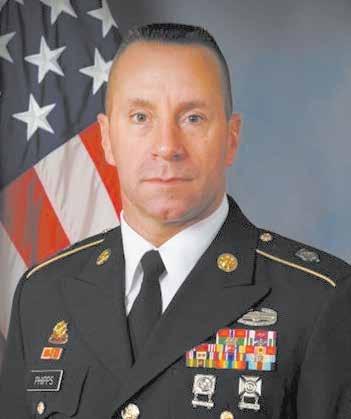
4 minute read
321st Drill Sergeants Take on a New Kind of Trainee
Story By Capt. Britney Fleming
Alpha Company Commander 1-321st Regiment and Capt. Michael Mascari, 1-321st
Advertisement
Photos by Sgt. Ian Valley and Spec. Jon Cortez
345th Public Affairs Detachment
Drill sergeants from the 1-321st Regiment, 2nd Brigade, 98th Training Division (Initial Entry Training) were given a unique opportunity to step away from Basic Combat Training to lead a different type of trainee.
Instead of fresh young faces who had never before worn the uniform, the drill sergeants would be working with senior officers and other Soldiers from the U.S. Army Reserve Sustainment Command (ARSC) where they would be outranked by most, if not all, of their trainees. It would provide new challenges and different ways of thinking, but the drill sergeants and command teams of 1-321st were up to the task.
“I’m still going to make them get down in the dirt and crawl,” said 1st Lt. Zachary Hazzard.
The ARSC, based in Birmingham, Alabama, delivers global materiel readiness, contracting, acquisition and Logistics Civil Augmentation Program (LOGCAP) capability for worldwide mission requirements. It features seven brigade-sized elements comprised of Soldiers from all over the U.S. Army Reserve.
Approximately 2,000 Soldiers participated in the CORE-20 exercise designed to train and evaluate them with Warrior Tasks and Training. Three members of the unit also competed in a Best Warrior Competition during the event.
The drill sergeants and cadre evaluated the Soldiers on a variety of tasks, many of which had not received this type of training nor practiced these skills in over a decade. ARSC Command Sgt. Major Christopher Luchsinger, himself a former drill sergeant, saw the exercise as a chance to prepare his troops for deployment.
“Well, we wanted to have some realistic, robust, innovative training to prepare them for what they may encounter while deployed, and that’s the intent of the mission, both technically and tactically, to prepare them for the mission ahead,” said Luchsinger.
The Soldiers kicked off the day with the Army Physical Fitness Test for those needing to qualify and familiarization training for the new Army Combat Fitness Test in the morning. This was all before participating in a variety of training lanes, including M-9 ranges, land navigation, medical training and React to Contact.
“A lot of these Soldiers hadn’t seen or touched a weapon in years, but we were really patient, and they were all very willing to listen to our instructions,” said Staff Sgt. Daneit Disla. “At the end of the day, we got everyone through it.”
The experience of the command teams coupled with the ingenuity and experience in conducting large-scale training events paid off. With only two days to conduct training, every minute would have to be planned perfectly. Challenges inevitably arose, but the training teams quickly adapted.
“Ideally, you would love to have a plan and have that plan work out, but that doesn’t always happen,” said Staff Sgt Penny Buzzella, a
drill sergeant within the battalion. “We’re used to having a backup plan. As drill sergeants, we always have something ready. Most of the Soldiers didn’t even know that we were executing backup plans. They thought it was business as usual. Staying calm in a moment of fury is
TRAINEE Cont’d on page 12





New Kind of Trainee Cont’d from page 11 what we do.”
ARSC took full advantage of the trainers on ground as Buzzella and her fellow drill sergeants conducted a Best Warrior Competition for three noncommissioned officers during the week. She said they did extremely well, despite the physically demanding training the competitors went through.
ARSC expressed desire to expand training in the future to include Field Training Exercises. Because of the professionalism of the 321st Soldiers, the ARSC requested continued support for upcoming scheduled training. The battalion will train more ARSC Soldiers in August at Joint Base Dix-Lakehurst. Buzzella said she’s excited for future opportunities like this.
“It’s important to maintain proficiency in your Warrior Tasks, “ Buzzella said. “Working at this level is mutually beneficial. They learn from subject matter experts and we are able to work with experienced trainees at a much higher level. Most of them have a lot of experience with their tasks, so they ask much more detailed questions.”
If you are interested in becoming a drill sergeant, or know a Soldier that might be, please contact Master Sgt. Jon Robinson, (828) 292-9931, jon.p.robinson3.mil@mail or Capt. Michael Mascari, (303) 868-8182, michael.p.mascari.mil@mail.mil, or you can email beadrillsergeant@ gmail.com.























